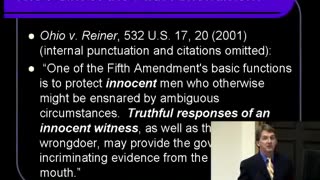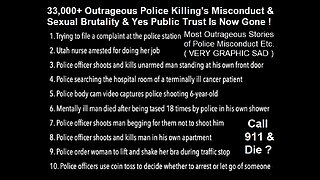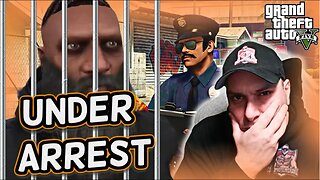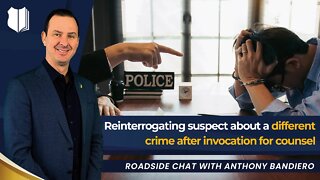Police Interrogation Techniques From New World Order -Do Not Talk At All Period !
The police are at my door. They want to talk to me. They told me I am not a suspect. I did absolutely nothing wrong. I have nothing to worry about. They can’t arrest me or do any harm to me if I did nothing wrong, right ? WRONG !
Almost every time I speak at a college or law school campus, there are one or two audience members whose mother or father is a police officer or a prosecutor. I always ask them: What did your parents tell you about dealing with the police?
Every one of them, without exception, has told me the same thing: My parents in law enforcement taught me years ago that I should never talk to the police, or agree to let them interview me about anything, or let them search my car or my apartment or my backpack without a warrant.
You need to stop for a minute, and let that sink in.
THE RIGHT TO REMAIN SILENT
With the New Year upon us, it is more vital than ever to have a clear understanding of your rights in dealing with police officers and the perils facing those who do not know and assert their rights in those encounters.
Everybody knows about the famous “right to remain silent” protected by the Fifth Amendment to the United States Constitution, which guarantees that no person may be compelled to be a witness against himself.
Not nearly enough people understand, however, that the protections of that right are for innocent people just as much as for the guilty. Too many people mistakenly assume that anyone who asserts his right to remain silent must have “something to hide” or must be guilty of something.
That is simply false.
I have lectured to thousands of college and law school students around the country about the Fifth Amendment. I tell them that everyone including those who think they have done nothing wrong should assert that privilege every chance they get.
WHY THE INNOCENT SHOULD REMAIN SILENT - All around this country, every day and night, police officers are advising other people’s children to give up their right to remain silent by answering a few questions, or to consent to a search that the officer has no right to demand.
But, it turns out, when these same officers go home at night, they advise their children to do just the opposite.
That pretty much sums it all up, and tells you just about everything you need to know about dealing with the police.
0:00 Intro
0:58 Offering food, drinks, and other items for comfort (Rapport-building);
1:33 Self-disclosure by the officer (Rapport-building);
2:01 Calling the suspect by their preferred name/title (Rapport-building);
2:15 Using contrasting emotions;
3:24 Ignoring invocation attempts (legality varies);
4:00 Confronting the suspect with (real and/or fake) evidence;
4:13 Maximizing seriousness of crime/situation;
4:32 Confrontation – directly confront / accuse suspect regarding their crime;
5:16 Showing concern for the suspect;
5:40 Silence;
6:21 Suggesting scenarios, explanations, and theories;
7:19 Repetitive questioning;
8:02 Open questions;
8:34 Situational futility;
8:55 Appealing to suspect's conscience;
10:48 Appealing to suspect's self-interest;
11:22 Using praise and/or flattery;
11:47 Highlighting detective's experience/expertise/authority;
12:33 Touching suspect in friendly encouraging manner;
12:53 Obtaining apology as admission of guilt.
Again The Fifth Amendment protects people from having to testify against themselves. Therefore, the prosecution must use evidence and witnesses instead of the testimony of the accused person to convict them. The point of the 5th Amendment is to protect people from saying something incriminating. However, people who invoke this right and refuse to say anything are often thought of as guilty or have something to hide. It seems that either way you are doomed because if you talk, you could mistakenly say something that could be used against you but if you do not, people assume you are guilty. If you do decide to talk to the police, you could make mistakes when explaining where you were at the time of the crime or you could be tricked into saying the wrong thing, and those statements could lead to you being convicted of a serious crime.
How to Create a Socialist State by Alexandria Ocasio-Cortez - There are eight levels of control that must be obtained before you are able to create a socialist state, The first is the most important. 1) Healthcare-Control healthcare and you control the people 2) Poverty-Increase the Poverty level as high as possible, poor people are easier to control and will not fight back if you are providing everything for them to live. 3) Debt--Increase the debt to an unsustainable level. That way you are able to increase taxes, and this will produce more poverty. 4) Gun Control-Remove people's ability to defend themselves from the Government, That way you are able to create a police state. 5) Welfare-Take control of every aspect of their lives (Food, Housing, and Income) 6) Education-Take control of what people read and listen to take control of what children learn in school, Think: "Common Core" 7) Religion--Remove the belief in God from the Government and schools, 8) Class Warfare--Divide the people into the wealthy and the poor, This will cause more discontent and it will be easier to take (Tax) the wealthy with the support of the poor,
But I committed no crime. Took nobody’s life. I didn’t even see anything criminal happen. I don’t know anyone who may have been there. I was 173 miles away when it happened. I don’t know any of the facts except from what others told me. I cannot possible be harmed, right?!”
Again, I am sorry to tell you, but you’re wrong. What people do not realize is what they don’t know actually can hurt them. If you don’t believe me, listen to the words of former United States Supreme Court Justice Robert Jackson, “Any lawyer worth his or her salt will tell the [client] in no uncertain terms to make no statement to the police under any circumstances.” Watts v. Indiana, 338 U.S. 49 (1949).
Let us look at the situation a little more closely. If the police ever ask you to come in to the station “just to chat” or are stopping by “because they only have a couple questions for you” that means one of two things:
You are a suspect; You are a possible suspect.
Does that clear the picture up? I sure hope so. There is absolutely no reason for the police to want to have any discussion with you unless they know something that you (probably) don’t. May be your name was mentioned during a discussion with another potential suspect, or perhaps someone is trying to frame you, or, worse yet, you look like the person who was present on the scene and an eyewitness made a mistake in identity. This kind of thing happens all the time. And innocent people end up in custody as a result.
There is no reason to talk to the police; especially if you’re innocent.
Here are the top ten reasons why you should not talk to the police:*
REASON #1: Talking to the police CANNOT and WILL NOT help you.
Talking to the police cannot make any difference. Nobody can “talk their way out of” an arrest. No matter how “savvy” or intelligent you think you might be, you will not convince them that you are innocent. And any ‘good’ statements that may help you that you tell the police cannot be introduced into evidence because of hearsay rules. It’s a lose-lose situation; don’t talk to the police.
REASON #2: Even if you’re guilty, and you want to confess and get it off your chest, you still shouldn’t talk to the police.
There is plenty of time to confess and admit guilt later. Why rush the inevitable? First, hire an attorney. Let them do their work, and may be you will win your case. It is much harder to win when there is a confession. For example, do you know what happens if the cop cannot be located and there is no confession? The case gets dismissed! (It’s not a universal rule, but it’s more common than you might think.) Don’t talk to the police.
REASON #3: Even if you are innocent, it’s easy to tell some little white lie in the course of a statement.
When people assert their innocence, they sometimes exaggerate their statements and tell a little white lie on accident. That same lie could be later used to destroy your credibility at trial. Don’t talk to the police.
REASON #4: Even if you are innocent, and you only tell the truth, and you don’t tell any little white lies, it is possible to give the police some detail of information that can be used to convict you.
If you make any statement — it could later be used against. E.g. “I did not kill the guy. I was not around the area when it happened. I don’t have a gun. I never owned a gun. I never liked the guy, but, hell, who did?” Bingo. We just found your incriminating statement: “I never liked the guy.” Don’t talk to the police.
REASON #5: Even if you were innocent, and you only tell the truth, and you don’t tell any little white lies, and you don’t give the police any information that can be used against you to prove motive or opportunity, you still should not talk to the police because the possibility that the police might not recall your statement with 100% accuracy.
Nobody has a perfect memory. That includes law enforcement. Don’t talk to the police.
REASON #6: Even if you’re innocent, and you only tell the truth, and your entire statement is videotaped so that the police don’t have to rely on their memory, an innocent person can still make some innocent assumption about a fact or state some detail about the case they overheard on the way to the police station, and the police will assume that they only way the suspect could have known that fact or that detail was if he was, in fact, guilty.
If you overhear a fact from someone else and later adopt it as your own, it can be used to crucify you at trial. Don’t talk to the police.
REASON #7: Even if you’re innocent, and you only tell the truth in your statement, and you give the police no information that can be used against you, and the whole statement is videotaped, a suspect’s answers can still be used against him if the police (through no fault of their own) have any evidence that any of the suspect’s statements are false (even if they are really true).
Honest mistakes by witnesses can land you in jail. Why take the risk? Don’t talk to the police.
REASON #8: The police do not have authority to make deals or grant a suspect leniency in exchange for getting as statement.
Law enforcement personnel do not have authority to make deals, grant you immunity, or negotiate plea agreements. The only entity with that authority is the County or Commonwealth Attorney in state court and the U.S. Attorney in federal court. The officers will tell you they do, but they are lying. They have a carte blanche to lie. Don’t talk to the police.
REASON #9: Even if a suspect is guilty, and wants to confess, there may be mitigating factors which justify a lesser charge.
You may be accused of committing one offense when, in fact, you are guilty of a lesser offense. By confessing to the higher offense, you are throwing away bargaining chips. The prosecutor can try the case with your confession to the higher offense. There is no reason to confess. Don’t talk to the police.
REASON #10: Even for a completely honest and innocent person, it is difficult to tell the same story twice in exactly the same way.
If trial is the first time you tell your story, then there is no other statement by you to contradict any of your facts. However, if you have told your story twice, once at trial, and once to the police, you are probably going to mess some facts up. It’s human nature. A good cross examination by a prosecutor will tear you apart. Don’t talk to the police.
Should I talk to the police? Won't I look guilty if I don't?
Fifth Amendment to the Constitution of the United States
"No person...shall be compelled in any criminal case to be a witness against himself..."
Should I talk to the police?
No and no. You should never talk to the police without first consulting an attorney. Police officers are trained to obtain confessions, admissions and inconsistencies. If you are innocent, they will use inconsistencies in your statements as evidence of guilt. There may be things that you did that make you look guilty which law enforcement will exploit. They may take your statements out of context or misunderstand you. When the officer later testifies at a hearing or at trial, they will testify to what they remember that you said, not to what you actually said. It is often much like the telephone game where several children sit in a circle and one child makes up a sentence and whispers it into the next child's ear. That child then tries to remember the sentence and whisper the exact same sentence verbatim to the next child and on and on. By the last child, the sentence and meaning has been completely changed. Oftentimes, the officer may spend an hour or more speaking with you and investigating the case before going back later to write down one or two sentences that he remembers you saying. He may paraphrase your words, but right them down as if they were direct quotes. He then would later testify that you stated what he or she wrote down, which may be dramatically different than what you said.
You can get your side of the story out, but why would you without knowing the rules of the game? When you speak to a police officer without a lawyer present, you probably don't know every criminal statute on the books, each and every element to every statute, the rules of criminal procedure, the rules of evidence, and case law interpretation of those rules and statutes. You may think that you are talking yourself out of an arrest, but instead, you may be admitting to the elements of a crime that you didn't even know you committed.
Won't it make me look guilty if I don't talk to police?
Absolutely not. It will make you look smart. The judges, prosecutors, and police officers all know the rules. If they were ever accused of a crime, the first thing most of them would do is pick up a phone and call a lawyer. This is a constitutional right and a protection you should utilize. Once you obtain a lawyer, that lawyer acts as a buffer between you and the police or prosecution. We can get your story across and any information that is helpful to you, but the State can't use it against you. In other words, no police officer can take the stand and testify that your lawyer said that you admitted or confessed to committing a crime or made any incriminating admissions. Additionally, the prosecutor cannot tell the jury that you didn't talk to police. They can't even mention it.
What should I do if a police officer wants to ask me about a crime?
You should tell the officer respectfully and politely that:
1) I would like to invoke my right to remain silent, and
2) I would like an attorney.
If you say those two things, all of the pressure the police place on you to talk goes away. They can't ask you any more questions. It's like magic. But if you don't say those two things, they keep applying pressure, lying to you, and convincing you that it is in your best interests to talk to them when it is not.
What can you do for me if a police officer wants to talk to me?
We are often retained by people under criminal investigation. After we are formally retained, we immediately contact the law enforcement agent and tell them that we represent our client. We then discuss the investigation with our client and get all of the information we can about what is going on. We then contact the law enforcement agent or officer and discuss the investigation. Sometimes, we will arrange for our client to talk to the agent or officer, while we are present. We often acquire a "proffer agreement" where none of the statements made by our client can later be used against them in the State's case-in-chief. Other times, we relay information from our client, other witnesses and other evidence to the investigating officer or agent in an attempt to convince them that a crime did not occur or that our client did not commit the crime alleged. Every case is different and fact specific, but it is critical that you get an experienced criminal defense attorney involved as soon as possible.
Top 10 Reasons Why You Should Not Talk with the Police
REASON #1: Talking to the police CANNOT help you. EVER.
If the police are talking to you, it’s because they suspect you have committed a crime. If they have detained you, it’s because they already have enough evidence to arrest you and they want to see if you will admit it and thus, give them an even stronger case against you. If they have evidence to arrest you for a crime, they will. If they don’t, they won’t. It’s as simple as that. Talking to them or not talking to them won’t make a difference! No one has ever “talked his way out of” an arrest. If the police have enough evidence to make an arrest, they will.
If you deny that you committed the crime, they will not believe you. They already have evidence suggesting that you committed the crime. They’ll assume you’re just doing what every criminal does in denying the offense. It will not prevent you from getting arrested. This is completely contrary to popular belief.
For some reason, many people think that they are savvy enough or eloquent enough or well educated enough to be able to talk to the police and convince the police not to arrest them. But ask any police officer if because of the eloquence and convincing story of the suspect, they have ever been convinced not to arrest somebody whom they had originally intended to arrest, and they will tell you no. They will tell you that in their experience, no one has ever talked themselves out of getting arrested. Talking to the police cannot help you. It cannot prevent you from getting arrested. It can only hurt.
REASON #2: Even if you’re guilty, and you want to confess and get it off your chest, you still shouldn’t talk to the police.
There is plenty of time to confess and admit guilt at a later stage of the proceedings. What’s the rush? Always get a lawyer first. Let the lawyer set up a deal whereby you get something in exchange for accepting responsibility for the offense; a better plea bargain, or maybe even immunity. If you confess to the police, you get nothing in return. Zero. In fact, you probably will get a harsher prosecution because the state’s case is now airtight, now that you have confessed.
REASON #3: Even if you are innocent, it’s easy to tell some little white lie in the course of a statement.
This kind of thing happens all the time. A person who is completely innocent and who is vehemently trying to assert their innocence will go overboard and take it a little bit too far and deny some insignificant fact, tell some little white lie, because they want to sound as innocent as possible. But if the police have evidence of that lie, it makes your entire statement look like a lie. The prosecutor will ask: “Why did he lie to the police? Why indeed would he lie to the police, unless he were guilty?”
That little white lie could be used to destroy your credibility at trial.
An example would be a man who is questioned about a murder. He wants to sound innocent. He wants to sound non-violent. He is, in fact, innocent. So he denies everything. He denies the killing. He denies being in the area where the killing occurred on the night that it occurred. He denies owning a gun, and denies that he has ever owned a gun in his whole life. But it turns out that this last statement is not true, And the police can prove it. He did at one time during his life own a gun. Now he has told a lie and the police have caught him and things will only go downhill from there. Although he is innocent of the murder, he has told a lie that will be used to destroy his credibility at trial and could be the cause of his conviction.
REASON #4: Even if you are innocent, and you only tell the truth, and you don’t tell any little white lies, it is possible to give the police some detail of information that can be used to convict you.
For example, a suspect is being questioned about a murder. He is truly innocent of the murder. But in the course of explaining his innocence, he makes the statement that he never liked the victim, because the victim was not a nice guy. A statement like that could be used to prove motive.
Or in the course of the statement, the suspect might admit that he was in the area of town where the murder was committed at the time it was committed. Although he’s innocent and although this statement is true, the prosecutor could use that statement to suggest that the suspect had the opportunity to commit the crime, which looks very bad in front of a jury.
REASON #5: Even if you were innocent, you still should not talk to the police because of the possibility that the police might not recall your statement with 100% accuracy.
What if the police officer remembers something wrong? What if he remembers you said “X” when actually you said “Y”? If the police officer takes the witness stand and contradicts your statements at trial, it will kill your credibility. You can take the witness stand and say “I never said that!” But it’s your word versus a police officer. Who’s the jury going to believe? Who will the jury assume is lying to save his own skin? Who will the jury believe is lying because he’s really guilty? You guessed it. YOU!
REASON #6: Even if you’re innocent, an innocent person can still make some innocent assumption about a fact or state some detail about the case they overheard on the way to the police station, and the police will assume that they only way the suspect could have known that fact or that detail was if he was, in fact, guilty.
Example: Suppose a police officer is questioning a suspect about a homicide. And the suspect makes the statement “I don’t know who killed the victim. I’ve never owned a gun in my life. I don’t even like guns.” On it’s face, there’s nothing incriminating about that statement. But suppose at trial, the prosecutor asks the police officer if anything about that statement surprised him. The police officer answers “Yes, it surprised me when the suspect mentioned a gun, because I had never mentioned a gun before that. I merely told him that I was investigating a homicide.”
When the officer said there has been a homicide, the suspect may have simply assumed that the killing was done with a gun. Or the suspect may have overheard in the police station some other officer talk about the fact that it was a shooting. But if the officer taking the statement had never mentioned a gun or a shooting, and the suspect makes the statement that he had never owned a gun, you give the prosecution the opportunity to create some high drama, suggesting that suspect has had a Freudian slip, and has made a statement about a gun because he is, in fact, the murderer. And as the murderer, he knew that a gun was used.
REASON #7: Even if you’re innocent, a suspect’s answers can still be used against him if the police (through no fault of their own) have any evidence that any of the suspect’s statements are false (even if they are really true).
Suppose the police have a statement from a witness who claims to have seen the suspect in the area where the crime was committed at the time of the incident. Suppose further that this witness is actually wrong, but has made an honest mistake. The suspect then gives a statement to the police in which he says he was nowhere near the area where the crime took place at the time of the incident. By giving the statement, the suspect has now created a conflict between his own statement and the statement of this witness. By itself, the statement of the witness that he or she saw the suspect in the area at the time the crime was committed is not that useful. But by giving this statement, and creating a conflict with this witness’s statement, the suspect has now made this relatively minor witness into the government’s star witness.
The jury will hear the conflict and will assume that the suspect is lying and wonder why.
So even if you tell the complete truth, you’re putting your cards on the table without first seeing what evidence the government has. And some bit of evidence which, through some honest mistake, contradicts part of your story, if the government has you set yourself up to be portrayed as a liar by giving a statement without first knowing what evidence the government has.
REASON #8: The police do not have authority to make deals or grant a suspect leniency in exchange for getting as statement.
People tell me all the time that they gave a statement to the police because the police told them that they would be better off if they confessed, better off if they admitted what they did wrong, better off if they cooperated. The police will make vague statements that things will go easier on the suspect if he simply admits what he did wrong. The police will also make vague statements suggesting that they will do what they can to help the suspect, that they will put in a good word with the prosecutor, if the suspect will just come clean.
Number One thing to remember: The police do not have authority to make deals, grant immunity, or negotiate plea agreements. The only entity with that authority is the State Attorney in state court and the U.S. Attorney in federal court. Despite their claim that they are trying to help you, the only help police are providing when they take your statement is giving you rope with which to hang yourself.
REASON #9: Even if a suspect is guilty, and wants to confess, there may be mitigating factors which justify a lesser charge.
Mitigating factors are rarely brought out by the police in an interview. Normally, police want to focus on the facts that will suggest the suspect has committed the most severe crime possible. In fact, the suspect may have committed a lesser grade of offense. And if given the opportunity to talk to an attorney first, the attorney may be able to explain to the suspect what facts are important in establishing that he is guilty of a lesser grade of an offense, and not a higher grade. A confession presented in this context to the State Attorney’s office might result in a lesser charge and a more appropriate and fair penalty.
REASON #10: Even for a completely honest and innocent person, it is difficult to tell the same story twice in exactly the same way.
If you tell your story one time at trial and you tell the truth and you’re innocent, there’s very little the prosecutor can do by way of cross examination. But if you’ve told your story twice, once at trial, and once previously in a statement to the police, many months apart, the chances are very high that, even if you are telling the truth, some little details in your statement are going to change.
A good cross examiner will pick up on these changes and will relentlessly question you about them in an effort to make it look like you are lying.
So for all these reasons, whether you are guilty or innocent, whether you want to confess or want to exonerate yourself, whether you’re poorly educated or the most eloquent speaker in the world, you should NEVER, EVER, under any circumstances, give a statement to the police when you have been detained as a suspect.
The Socialist Party of the United States of America (SPUSA), usually simplified as Socialist Party USA or Socialist Party, is a multi-tendency democratic socialist party in the United States. The SPUSA was founded in 1973 as a successor to the Socialist Party of America, which had been renamed Social Democrats, USA a year before. The party is officially committed to multi-tendency democratic socialism. The Socialist Party USA, along with its predecessor, has received varying degrees of support when its candidates have competed against those from the Republican and Democratic parties. The SPUSA advocates for complete independence from the Democratic Party. The SPUSA self-describes as opposing all forms of oppression, specifically capitalism and authoritarian forms of communism, the Party advocates for the creation of a 'radical democracy that places people's lives under their own control—a non-racist, classless, feminist socialist society [...] where working people own and control the means of production and distribution through democratically-controlled public agencies, cooperatives, or other collective groups; where full employment is realized for everyone who wants to work; where workers have the right to form unions freely, and to strike and engage in other forms of job actions; and where the production of society is used for the benefit of all humanity, not for the private profit of a few'. The SPUSA's National Office is located at 168 Canal Street in the Chinatown neighborhood of New York City. It had been headquartered at the AJ Muste Institute, also in New York City, but the party and all other tenants were forced to move when the building was sold in 2016. The party has four chartered state organizations in California, Michigan, New Jersey, and New York, as well as eighteen chartered locals throughout the country.
-
 46:38
46:38
What If Everything You Were Taught Was A Lie?
1 year agoYour Right to Remain Silent A New Answer to an Old Question - Do Not Talk ? O.K.
293 -
 21:55
21:55
What If Everything You Were Taught Was A Lie?
1 year agoOutrageous Police Killing's Misconduct Police Brutality and Public Trust Is Now Gone!
2.13K13 -
![Police in America 2023 [This Week in Tyranny: Episode 43] with Konrad Rogoz](https://hugh.cdn.rumble.cloud/s/s8/1/U/m/t/e/Umten.0kob-small-Police-in-America-2023-This.jpg) 1:08:10
1:08:10
Truth and Law
8 months agoPolice in America 2023 [This Week in Tyranny: Episode 43] with Konrad Rogoz
107 -
 26:38
26:38
The Memory Hole
3 months ago“The laws of conspiracy are...used to intimidate and silence all kinds of dissent” (1975)
1.21K1 -
 7:18
7:18
Shawalichannel
1 year agoOnly 0.3% of migrants arrested for crossing Channel under 'cruel and pointless' new law
44 -
 5:23
5:23
Cocoproteinshake
1 year agoPolice Interrogation
31 -
 17:25
17:25
Good Luck America
3 years agoCops Get Recorded Talking About Getting Vacation For Shooting Someone - Is This A Big Deal?
57 -
 10:26
10:26
Bestie
5 years ago8 Things You Need To Know When Dealing With The Police
70 -
 3:27
3:27
fun and funny
1 year agoMaster uncovers three chilling Madeleine McCann speculations as police end search of supply
44 -
 6:27
6:27
The Search and Show with Blue to Gold
1 year agoEp #375 Reinterrogating suspect about a different crime after invocation for counsel
7